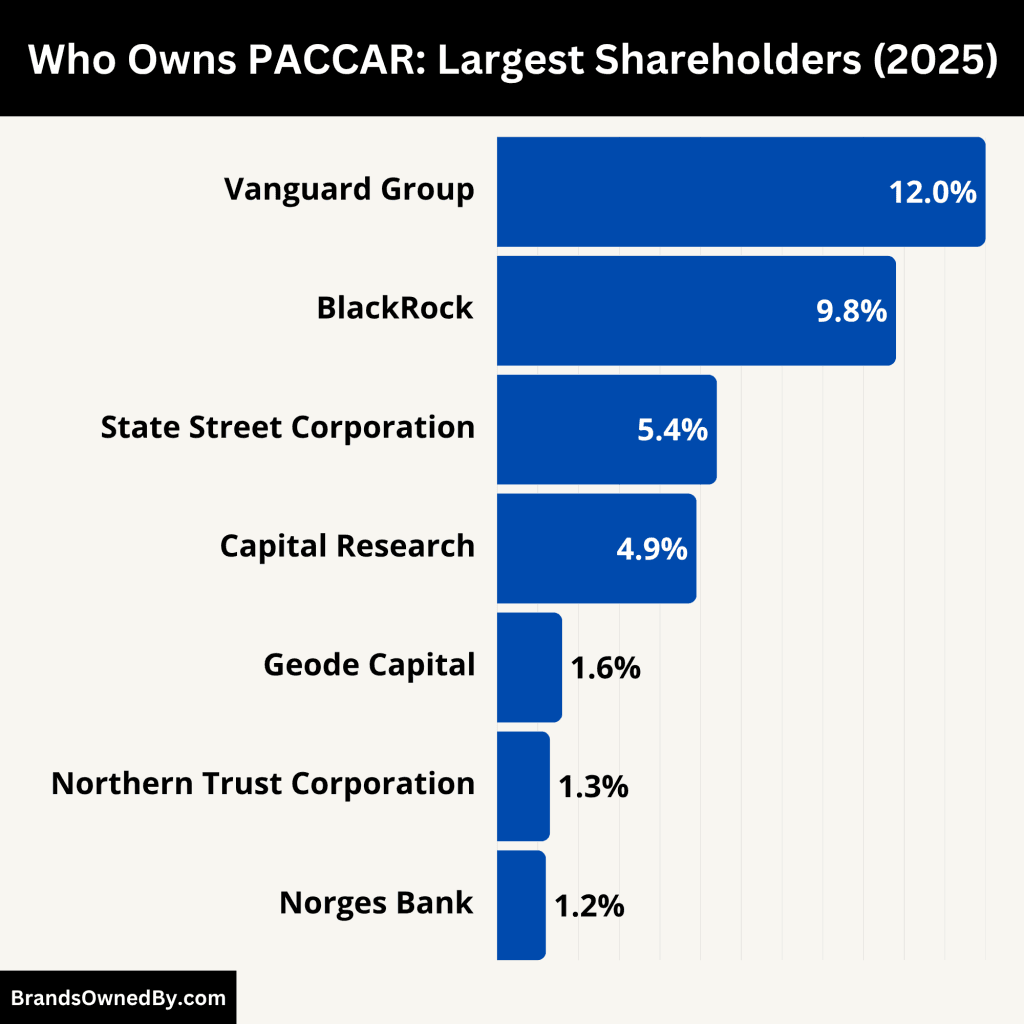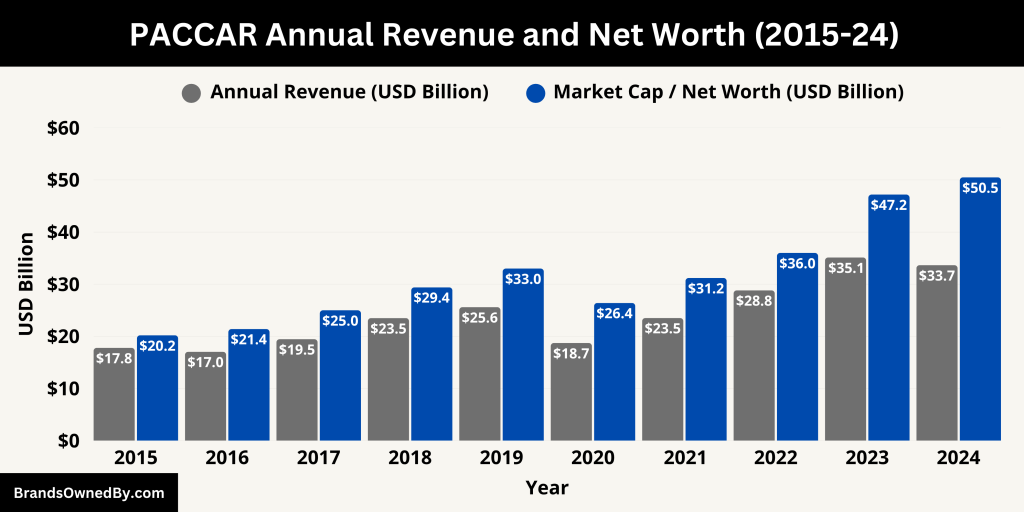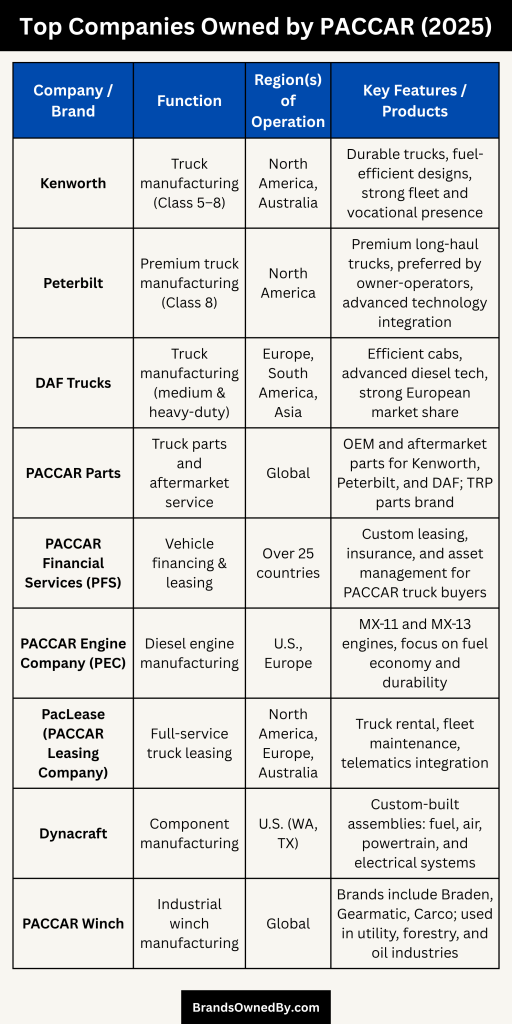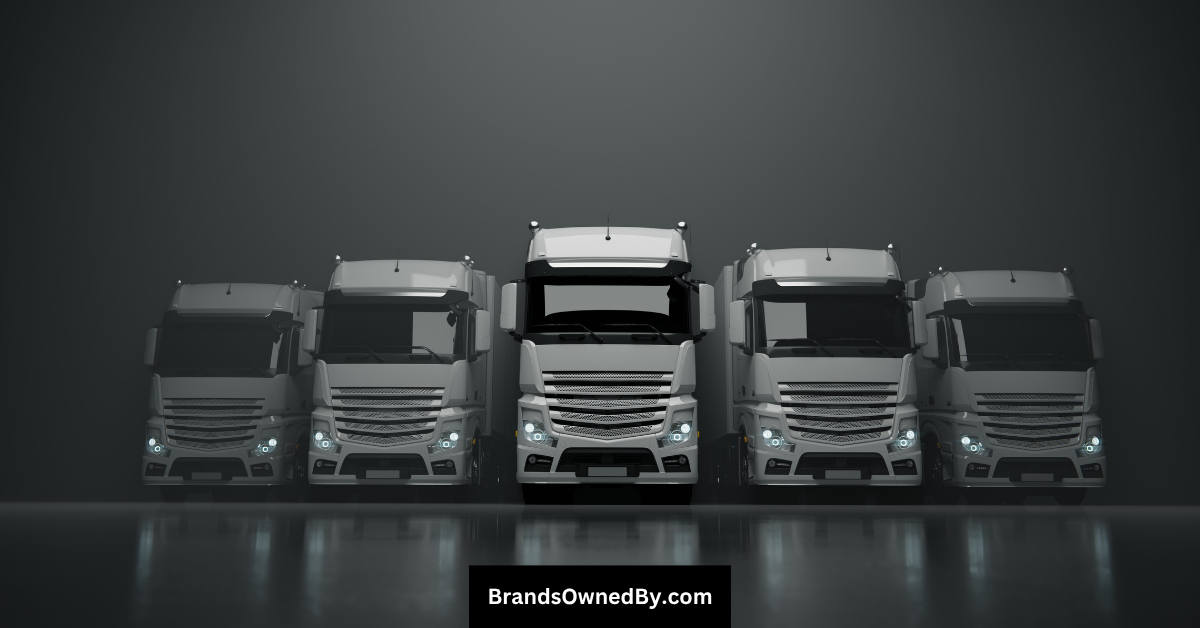PACCAR is one of the world’s leading truck manufacturers, but many still wonder who owns PACCAR and how control over the company is structured. This article dives deep into PACCAR’s ownership, leadership, financials, and subsidiaries to provide a clear understanding of the company as of 2025.
PACCAR Company Profile
PACCAR Inc is a leading global technology company that specializes in the design, manufacture, and customer support of high-quality commercial trucks. It is best known for its premium truck brands Kenworth, Peterbilt, and DAF. In addition to vehicle production, PACCAR operates a strong parts distribution business, financial services, and manufactures its own advanced diesel engines.
Headquartered in Bellevue, Washington, PACCAR has operations in over 100 countries and manufacturing facilities in the United States, Europe, Australia, and Mexico. Its trucks are commonly used for long-haul freight, construction, and municipal purposes. PACCAR is publicly listed on the NASDAQ under the ticker symbol PCAR and consistently ranks among the Fortune 500 companies.
Founders and Early History
PACCAR traces its roots back to 1905, when it was originally founded as the Seattle Car Manufacturing Company. The company was launched by William Pigott Sr., an industrialist from Washington state. It initially produced railway and logging equipment for the Pacific Northwest.
In 1917, the company merged with Twohy Brothers to form Pacific Car and Foundry Company. During World War II, it played a key role in military vehicle and tank production, which significantly boosted its capabilities and reputation.
Major Milestones in PACCAR’s History
- 1905 – Founded as Seattle Car Manufacturing Company by William Pigott Sr.
- 1917 – Merged with Twohy Brothers to become Pacific Car and Foundry Company.
- World War II Era – Produced Sherman tanks and other military vehicles for the U.S. government.
- 1945 – Entered the truck manufacturing business with the acquisition of Kenworth Motor Truck Company.
- 1958 – Acquired Peterbilt Motors Company, expanding its heavy-duty truck portfolio.
- 1960s–70s – Diversified into several sectors but ultimately returned to focus exclusively on transportation.
- 1972 – Officially changed its name to PACCAR Inc, reflecting its transportation-centric identity.
- 1996 – Acquired DAF Trucks of the Netherlands, marking a major entry into the European market.
- 2010 – Opened a state-of-the-art engine manufacturing facility in Mississippi to produce PACCAR-branded engines.
- 2020s – Expanded into electric and autonomous vehicle technologies, including battery-electric trucks and partnerships with tech firms.
- 2023–2025 – Focused on digital services, connected fleet technologies, and sustainable logistics, making PACCAR a leader in green trucking solutions.
PACCAR’s journey from railcar builder to a global truck manufacturing giant is a story of strategic growth, innovation, and consistent reinvestment in core industrial strengths. The company continues to lead in efficiency, vehicle quality, and emerging technologies for commercial transportation.
Who Owns PACCAR: Top Shareholders

PACCAR is a publicly traded company listed on the NASDAQ under the ticker symbol PCAR. There is no single individual or family that owns a controlling share of the company. Instead, it is owned by a mix of institutional investors and individual shareholders.
The largest shareholders are large financial institutions and asset managers. These entities hold significant influence due to their collective voting power, though none owns more than 15% of the company.
Here’s a list of the major shareholders of PACCAR as of June 2025:
| Shareholder | Approx. Ownership (%) | Type | Influence Level |
|---|---|---|---|
| The Vanguard Group | 11.5% | Institutional (Passive) | High via proxy voting |
| BlackRock Inc. | 9.8% | Institutional (Passive) | High via proxy voting |
| State Street Corporation | 5.4% | Institutional (Passive) | Moderate to High |
| Capital Research & Management (American Funds) | 4.9% | Institutional (Active) | Moderate |
| Geode Capital Management | 1.6% | Institutional (Passive) | Low |
| Northern Trust Corporation | 1.3% | Institutional (Passive) | Low |
| Norges Bank Investment Management | 1.2% | Sovereign Wealth Fund | Moderate to High |
| Other Institutional & Public Shareholders | 40.3% | Mixed (Retail, ETFs, Funds) | Diffuse but collectively strong |
The Vanguard Group – Approx. 11.5%
The Vanguard Group is PACCAR’s largest institutional shareholder as of 2025. It owns approximately 11.5% of the total outstanding shares. Vanguard holds these shares across various index and mutual funds. Though it doesn’t involve itself in operational decisions, its voting rights at shareholder meetings carry considerable weight.
Vanguard supports long-term value and sustainable growth strategies. It generally votes on executive compensation, board appointments, and ESG proposals, but does not directly influence PACCAR’s management.
BlackRock Inc. – Approx. 9.8%
BlackRock is the second-largest shareholder of PACCAR, holding about 9.8% of the company’s shares. Like Vanguard, BlackRock’s position is spread across numerous ETFs and mutual funds, particularly through its iShares fund series.
It is a passive investor but regularly exercises proxy voting rights. BlackRock emphasizes board diversity, climate disclosure, and long-term risk oversight, which indirectly impacts corporate decisions at companies like PACCAR.
State Street Corporation – Approx. 5.4%
State Street holds about 5.4% of PACCAR. As a major index fund manager, State Street invests in companies like PACCAR through its SPDR ETFs and institutional accounts.
It rarely engages with PACCAR’s management directly, but its proxy voting participation and corporate governance principles make it a key stakeholder. State Street is often aligned with the broader institutional consensus during major shareholder meetings.
Capital Research & Management (American Funds) – Approx. 4.9%
Capital Research and Management, operating under the American Funds brand, owns around 4.9% of PACCAR. It is a highly regarded long-term investor with a history of holding positions in stable, profitable companies.
Unlike passive index fund managers, Capital Research may engage more directly with management teams. While it does not seek control, its influence is noted in strategic decisions, especially regarding long-term capital allocation and dividend policy.
Geode Capital Management – Approx. 1.6%
Geode Capital, which manages certain Vanguard fund assets, holds about 1.6% of PACCAR shares. It follows a similar passive investing approach and does not engage in active corporate oversight.
Geode’s role is mostly technical in nature, serving as a sub-advisor for index-based investment strategies. Its control influence is minimal, but it contributes to the collective institutional block.
Northern Trust Corporation – Approx. 1.3%
Northern Trust holds approximately 1.3% of PACCAR. It is a respected wealth and asset management firm, and its holdings reflect high-net-worth and institutional clients’ interests.
It typically votes in line with ESG standards and long-term value preservation principles but remains passive in terms of operational involvement.
Norges Bank Investment Management (Norwegian Sovereign Wealth Fund) – Approx. 1.2%
Norges Bank owns around 1.2% of PACCAR. It is one of the world’s largest sovereign wealth funds and a prominent institutional investor across global markets.
Norges Bank is known for publishing detailed voting records and publicly advocating for better governance, transparency, and sustainability. Its stake in PACCAR, while modest, comes with influential proxy voting capabilities.
Retail and Public Shareholders – Approx. 40.3%
A large portion of PACCAR’s shares—around 40.3%—is owned by individual investors, retirement accounts, ETFs, mutual funds, and smaller institutions.
These investors do not typically coordinate or have board-level influence individually. However, their collective participation is important for liquidity, valuation, and market confidence in the stock.
Who Builds PACCAR Engines?
PACCAR engines are designed, developed, and manufactured by PACCAR Engine Company (PEC). It is a wholly owned subsidiary of PACCAR Inc. PEC was established to give PACCAR full control over its powertrain systems and to enhance integration between its engines and truck brands (Kenworth, Peterbilt, and DAF).
PEC produces advanced diesel engines that meet global emissions standards while maximizing performance and fuel efficiency. The company focuses on reliability, low maintenance costs, and long-term durability — key features expected by fleet operators and truck owners.
Where PACCAR Engines Are Manufactured
PACCAR engines are manufactured in two main facilities:
Columbus, Mississippi, USA
This state-of-the-art manufacturing plant opened in 2010 and serves the North American market. It produces the PACCAR MX-11 and PACCAR MX-13 engines, which are used in Kenworth and Peterbilt trucks. The Columbus plant is highly automated and designed for precision machining, testing, and assembly.
Eindhoven, Netherlands
The DAF Trucks engine plant in Eindhoven manufactures PACCAR engines for the European and international markets. It also develops engines used in DAF trucks, which share PACCAR’s engine architecture. This facility handles emissions compliance for Europe (Euro VI) and other global standards.
Types of PACCAR Engines
PACCAR produces several proprietary engines tailored for medium and heavy-duty commercial trucks:
- PACCAR MX-13 Engine
Designed for long-haul and heavy applications. It offers up to 510 horsepower and is known for durability, torque, and fuel efficiency. This is the most widely used engine across all three PACCAR brands. - PACCAR MX-11 Engine
Smaller and lighter than the MX-13, this engine is optimized for regional hauling and vocational applications. It delivers up to 445 horsepower with lower weight and high performance. - PACCAR PX Series Engines
The PX-7 and PX-9 engines are used in medium-duty applications. These engines are based on Cummins designs but are branded and configured for PACCAR use in Kenworth and Peterbilt trucks.
Engine Design and Innovation
PACCAR engines are known for integrating the latest technologies, including:
- Variable geometry turbochargers
- High-pressure common rail fuel systems
- Lightweight engine blocks and components
- Advanced telematics and diagnostics systems
- Extended oil and service intervals
PACCAR’s vertically integrated approach allows it to customize engines specifically for the needs of each truck brand and customer type.
Who is the CEO of PACCAR?
R. Preston Feight is PACCAR’s Chief Executive Officer and a member of the Board of Directors, serving since July 2019. He is 57 years old (born November 30, 1967). Feight holds a B.S. in Mechanical Engineering from Northern Arizona University and an M.S. in Engineering Management from the University of Colorado. He is also a licensed professional engineer and commercial truck driver.
Career at PACCAR
Feight has a 26‑year track record at PACCAR. Notable roles include:
- Kenworth Chief Engineer (2008–2012)
- Kenworth Assistant General Manager, Marketing & Sales (2012–2014)
- General Manager of Kenworth Truck Company and PACCAR Vice President (2015–2016)
- President of DAF Trucks (2016–2018)
- Executive Vice President at PACCAR (Sept 2018–June 2019).
Before joining PACCAR, he worked as an engineer at Ford Motor Company (six years) and AlliedSignal (two years).
Leadership Style and Focus
Feight leads with a strong focus on manufacturing excellence, customer-centric design, and sustainability. He has overseen investments in electric and autonomous truck development, connected services, and digital platforms. During his tenure, PACCAR achieved record parts revenue, strong financial results, and expansion in green technologies.
He also emphasizes navigating regulatory and economic challenges, such as tariffs and emissions regulations, while serving North American and global markets.
Compensation and Ownership
As of early 2025, Feight’s base salary is approximately $5.05 million annually, and his total compensation (including bonuses and stock options) exceeded $20 million in 2023.
He personally owns over 200,000 PACCAR shares, with an estimated personal stake worth around $19 million; including options, his holdings total approximately 350,000 shares. This aligns his incentives with long-term shareholder value.
Executive Team & Governance Role
Feight chairs the executive leadership team. He reports directly to the Board of Directors, where Mark C. Pigott serves as Executive Chairman. The board oversees strategic direction, executive compensation, major investments, and executive succession planning.
Past CEOs – Recent Leadership
- Ronald E. Armstrong (2014–2019): Spearheaded continued global expansion of Kenworth, Peterbilt, and DAF; oversaw investments in engines, parts, and financial services.
- Mark C. Pigott (1997–2014): Previously served as Chairman & CEO; is now Executive Chairman. He drove major growth through the international acquisition of DAF (1996), digital transformation, and consistent profitability.
PACCAR Annual Revenue and Net Worth

PACCAR reported consolidated revenues of $33.66 billion in 2024, making it the second‑best year in the company’s history. Net income for 2024 reached $4.16 billion, reflecting a strong 12.4% after‑tax return on revenues.
In the 12 months ending mid‑2025, PACCAR’s TTM revenue stood at approximately $32.36 billion. This represents an 8.6% decline from the $35.13 billion achieved in 2023.
The first quarter of 2025 produced $7.44 billion in revenue, a 14.9% drop year-over-year. Net income was $505.1 million, or $0.96 per share, though adjusted net income (excluding a one-time litigation charge) was $769.6 million ($1.46 per share).
PACCAR Net Worth in 2025
PACCAR’s market capitalization—its perceived market value—fluctuated between $47 billion and $50.5 billion in mid‑2025. Estimates included:
- $48.7 billion as of June 16, 2025
- $47.6 billion as of June 20, 2025
- $50.5 billion as of May 14, 2025.
The differences reflect daily stock market movements, but overall PACCAR remains a mid‑$40 billion range company in net worth.
As of mid‑2025, PACCAR’s enterprise value (which includes debt and cash) was reported between $55 billion–$56 billion. These figures highlight continued solid investor confidence in PACCAR’s business model.
While full-year 2024 saw record revenue and profit, the revenue dip in early 2025 reflects broader market softness in the commercial truck industry. Still, PACCAR’s aftermarket parts and financial services segments remain reliable earnings engines. The board has approved consistent dividends—$4.17 per share in 2024—plus increased payouts in early 2025. Meanwhile, the company continues investing heavily in capital projects ($115 million in Q1 2025).
Here is an overview of PACCAR’s annual revenue and approximate market capitalization (net worth) for the last 10 years (2015–2024):
| Year | Annual Revenue (USD Billion) | Approx. Market Cap / Net Worth (USD Billion) |
|---|---|---|
| 2024 | 33.66 | 48.7–50.5 |
| 2023 | 35.13 (record year) | 45.0–47.2 |
| 2022 | 28.82 | 33.5–36.0 |
| 2021 | 23.52 | 29.8–31.2 |
| 2020 | 18.73 | 25.0–26.4 |
| 2019 | 25.60 | 30.5–33.0 |
| 2018 | 23.50 | 27.0–29.4 |
| 2017 | 19.45 | 23.5–25.0 |
| 2016 | 17.03 | 20.0–21.4 |
| 2015 | 17.79 | 19.5–20.2 |
Companies Owned by PACCAR

PACCAR’s diversified group of companies ensures control over every part of the truck lifecycle — from design and manufacturing to finance, service, and parts. As of 2025, PACCAR remains a vertically integrated vehicle and technology company with a global footprint across transportation and industrial equipment sectors.
Here’s a list of the major companies and brands owned by PACCAR in 2025:
| Company / Brand | Function | Region(s) of Operation | Key Features / Products |
|---|---|---|---|
| Kenworth | Truck manufacturing (Class 5–8) | North America, Australia | Durable trucks, fuel-efficient designs, strong fleet and vocational presence |
| Peterbilt | Premium truck manufacturing (Class 8) | North America | Premium long-haul trucks, preferred by owner-operators, advanced technology integration |
| DAF Trucks | Truck manufacturing (medium & heavy-duty) | Europe, South America, Asia | Efficient cabs, advanced diesel tech, strong European market share |
| PACCAR Parts | Truck parts and aftermarket service | Global | OEM and aftermarket parts for Kenworth, Peterbilt, and DAF; TRP parts brand |
| PACCAR Financial Services (PFS) | Vehicle financing & leasing | Over 25 countries | Custom leasing, insurance, and asset management for PACCAR truck buyers |
| PACCAR Engine Company (PEC) | Diesel engine manufacturing | U.S., Europe | MX-11 and MX-13 engines, focus on fuel economy and durability |
| PacLease (PACCAR Leasing Company) | Full-service truck leasing | North America, Europe, Australia | Truck rental, fleet maintenance, telematics integration |
| Dynacraft | Component manufacturing | U.S. (WA, TX) | Custom-built assemblies: fuel, air, powertrain, and electrical systems |
| PACCAR Winch | Industrial winch manufacturing | Global | Brands include Braden, Gearmatic, Carco; used in utility, forestry, and oil industries |
Kenworth Truck Company
Kenworth is one of PACCAR’s most iconic subsidiaries. It manufactures medium- and heavy-duty trucks, primarily for the North American market. Known for durability, comfort, and advanced engineering, Kenworth trucks are widely used in construction, long-haul freight, and municipal services. The brand emphasizes fuel efficiency, safety technologies, and customizable vehicle options.
PACCAR acquired Kenworth in 1945, marking its entry into the truck manufacturing business. Kenworth operates manufacturing plants in the U.S. and Mexico and has a strong dealer network across North America.
Peterbilt Motors Company
Peterbilt is another flagship PACCAR brand. It specializes in premium Class 8 trucks and is widely recognized for its signature grille and operator-focused design. Peterbilt trucks are popular among owner-operators and large fleet customers due to their high resale value and build quality.
PACCAR acquired Peterbilt in 1958. The company operates out of Denton, Texas, and produces both sleeper and day cab trucks. In recent years, Peterbilt has also been actively involved in the development of battery-electric and hydrogen fuel cell vehicles.
DAF Trucks
DAF Trucks is PACCAR’s European truck manufacturing arm. Based in the Netherlands, DAF serves markets across Europe, Asia, and South America. It produces medium- and heavy-duty trucks and has a strong presence in logistics and fleet solutions.
PACCAR acquired DAF in 1996, expanding its reach beyond North America. DAF’s innovations in fuel economy, vehicle aerodynamics, and safety have earned it multiple awards. The brand’s European-style cabs and efficient diesel engines are hallmarks of its product line.
PACCAR Parts
PACCAR Parts is responsible for the global distribution of truck parts and related services. It supports the Kenworth, Peterbilt, and DAF brands by offering genuine OEM parts, aftermarket components, and maintenance solutions. It also operates parts distribution centers (PDCs) worldwide.
PACCAR Parts contributes significantly to recurring revenue and customer retention by ensuring consistent aftermarket service. The company also operates TRP — its global parts brand that serves multiple truck makes and trailers.
PACCAR Financial Services
PACCAR Financial Services (PFS) provides financing, leasing, and insurance solutions to Kenworth, Peterbilt, and DAF customers. It supports dealer networks and fleet clients in over 25 countries.
PFS is essential to enabling customers to acquire new and used trucks with flexible financing terms. It also offers asset management, maintenance planning, and vehicle resale programs. This division accounts for a large portion of PACCAR’s service-related earnings.
PACCAR Engine Company
PACCAR Engine Company (PEC) designs and manufactures advanced diesel engines used in Kenworth, Peterbilt, and DAF trucks. The company’s engine range includes the PACCAR MX-11 and MX-13 engines, known for performance, reliability, and fuel efficiency.
The state-of-the-art engine plant in Mississippi serves North America, while DAF handles engine manufacturing in Europe. PACCAR also continues to invest in next-generation powertrains, including electric drivetrains and hydrogen systems.
PACCAR Leasing Company (PacLease)
PacLease is PACCAR’s full-service truck leasing subsidiary. It operates through a network of franchises and company stores across North America, Europe, and Australia. The company offers lease and rental options for Kenworth and Peterbilt trucks.
PacLease also provides custom leasing solutions that include maintenance, telematics, and fleet management. It supports small businesses and large logistics firms with tailored commercial vehicle strategies.
Dynacraft
Dynacraft is a PACCAR subsidiary that manufactures truck components, including fuel systems, air systems, powertrain components, and electrical assemblies. It operates plants in Washington and Texas and supports all three major PACCAR truck brands.
Dynacraft plays a key role in supply chain integration by producing high-quality components that match PACCAR’s vehicle specifications. This in-house capability enhances cost control and ensures consistent part quality.
PACCAR Winch
PACCAR Winch manufactures industrial winches under the Braden, Gearmatic, and Carco brands. These winches are used in oil and gas, utility, construction, and forestry applications. While not truck-based, this business segment serves complementary industrial sectors.
PACCAR Winch is based in Oklahoma and has a strong reputation for rugged, dependable equipment. It adds diversity to PACCAR’s industrial portfolio.
Conclusion
PACCAR is a powerful force in the global truck manufacturing industry. The question of who owns PACCAR reveals a structure dominated by institutional investors, with no single controlling owner.
The company is led by CEO Preston Feight and operates through several world-class subsidiaries. With strong revenue, global operations, and a history of innovation, PACCAR remains a key player in the commercial vehicle industry.
FAQs
Is PACCAR American-owned?
Yes, PACCAR is an American-owned company. It is publicly traded and headquartered in Bellevue, Washington, USA. While its shares are owned globally by institutional and retail investors, the company remains based in the United States.
Who is the owner of the PACCAR family?
PACCAR is not family-owned. It was originally founded by William Pigott Sr. in 1905, but today it is a public company with no single family having controlling ownership. However, the Pigott family remains connected, with Mark C. Pigott serving as Executive Chairman.
Who is the majority shareholder of PACCAR?
There is no single majority shareholder of PACCAR. The largest shareholder is The Vanguard Group, which owns about 11.5% of the company. Other major shareholders include BlackRock Inc. and State Street Corporation. All are institutional investors.
Who acquired PACCAR?
PACCAR has not been acquired. It remains an independent, publicly traded company listed on NASDAQ under the ticker symbol PCAR.
Is PACCAR a German company?
No, PACCAR is not German. It is an American company with global operations. However, one of its subsidiaries—DAF Trucks—is based in the Netherlands and serves the European market.
What does PACCAR stand for?
PACCAR originally stood for Pacific Car and Foundry Company, the company’s name from 1917 until it was changed to PACCAR Inc. in 1972. The name reflects its early involvement in rail and industrial manufacturing on the U.S. West Coast.
Where is PACCAR located in the US?
PACCAR’s global headquarters is located in Bellevue, Washington, in the United States. It also operates manufacturing and distribution facilities in Texas, Ohio, Mississippi, and other U.S. states.
Are Cummins and PACCAR the same company?
No, Cummins and PACCAR are separate companies. Cummins is an independent engine manufacturer, while PACCAR builds its own engines through PACCAR Engine Company. However, PACCAR also uses some Cummins engines in its trucks, particularly in medium-duty applications.
Who owns PACCAR Engine?
PACCAR Engine Company is a wholly owned subsidiary of PACCAR Inc. It designs and manufactures PACCAR-branded engines used in Kenworth, Peterbilt, and DAF trucks.
Does PACCAR own Kenworth?
Yes, PACCAR owns Kenworth Truck Company. It acquired Kenworth in 1945, marking the company’s entry into the truck manufacturing business.
Does PACCAR own Peterbilt?
Yes, PACCAR owns Peterbilt Motors Company. It purchased Peterbilt in 1958. Peterbilt is a premium truck brand based in Denton, Texas.
Who owns PACCAR company?
PACCAR is owned by public shareholders. The largest stakeholders are institutional investors like Vanguard, BlackRock, and State Street. No single individual or entity owns a controlling stake in the company.
Who owns PACCAR today?
PACCAR is publicly traded and owned by shareholders. The largest owners are Vanguard, BlackRock, and State Street.
Is PACCAR a private or public company?
PACCAR is a public company listed on NASDAQ under the symbol PCAR.
Who founded PACCAR?
PACCAR began as the Seattle Car Manufacturing Company in 1905. It later became the Pacific Car and Foundry Company.
Does PACCAR own Peterbilt and Kenworth?
Yes, PACCAR owns both Peterbilt Motors Company and Kenworth Truck Company.
Where is PACCAR headquartered?
PACCAR is headquartered in Bellevue, Washington, USA.
What does PACCAR manufacture?
PACCAR manufactures commercial trucks, diesel engines, and provides financial services and truck parts.
How profitable is PACCAR?
PACCAR is highly profitable, with a net income of around $4 billion and revenue exceeding $34 billion as of 2024.

